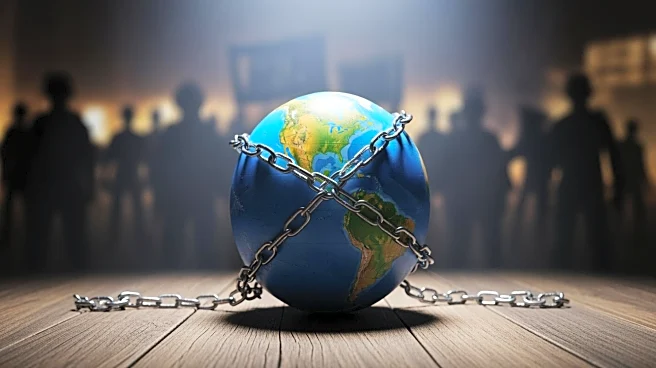What's Happening?
During the United Nations climate talks in Belem, Brazil, a group of activists clashed with security personnel, attempting to breach the main venue. The incident resulted in minor injuries to two security workers and minor damage to the venue. The confrontation
occurred as attendees were leaving the COP30 event. According to a statement from U.N. Climate Change, Brazilian and U.N. security personnel responded by securing the venue and following established security protocols. The incident is under investigation by Brazilian and U.N. authorities, and the venue remains secure with ongoing COP negotiations. Agustin Ocaña, a mobilization coordinator for the Global Youth Coalition, witnessed the event, noting that the protesters included individuals in yellow shirts and Indigenous community attire. The protest escalated when security guards closed the doors and called for reinforcements, leading to physical clashes.
Why It's Important?
The disruption at the UN climate talks highlights ongoing tensions regarding the participation and representation of Indigenous communities in global environmental discussions. The protesters' actions underscore the frustration felt by some Indigenous groups over resource allocation and the perceived lack of attention to pressing issues such as education, health, and forest protection. This incident serves as a reminder of the urgent need for inclusive dialogue and action in addressing climate change, as well as the potential for increased activism if these concerns are not adequately addressed. The event may influence future security measures at international conferences and prompt discussions on how to better integrate Indigenous voices in climate policy-making.
What's Next?
The investigation by Brazilian and U.N. authorities will likely focus on identifying the causes of the security breach and preventing similar incidents in the future. The outcome may lead to enhanced security protocols at international events and increased dialogue with Indigenous groups to address their concerns. Stakeholders, including government officials and environmental organizations, may push for more inclusive policies and actions that consider the needs and rights of Indigenous communities. The incident could also spark broader discussions on the effectiveness of current climate negotiations and the need for tangible outcomes.
Beyond the Headlines
The protest at the UN climate talks reflects deeper issues related to the representation of marginalized groups in global decision-making processes. It raises ethical questions about the balance between security and the right to protest, as well as the cultural dimensions of environmental activism. The event may contribute to long-term shifts in how international conferences are organized, with a greater emphasis on inclusivity and transparency. Additionally, it highlights the growing impatience among activists and Indigenous communities for concrete actions rather than prolonged discussions.

















